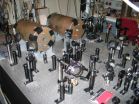Six months after taking the Respiragene test to identify susceptibility for lung cancer risk, 32% of the randomly recruited smokers in the study had quit smoking altogether and a further 48% had reduced their intake of cigarettes. More than half of the smokers taking the risk test (63%) had used nicotine replacement products, the first line therapy recommended to help smokers quit. More than 90% of those who took the risk stratification test said they would recommend it to family and friends who smoked.
"The findings from this research support other studies showing gene-based risk testing of smokers leads to significantly reduced smoking rates," said Dr Robert Young, Associate Professor of Medicine and Molecular Genetics at Auckland University, who presented the study findings. "Current quit rates are pretty dismal. Given the number of lung cancer deaths each year, improving those quit rates must be a priority."
Only about 4% to 7% of people are able to quit smoking on any given attempt without medicines or other help, according to the American Cancer Society.
Lung cancer kills more than 440 Americans a day and more than 157,000 a year. In the United States, lung cancer accounts for nearly 30% of all smoking-related deaths. The single most important action a smoker can take to reduce their risk is to quit smoking. Although the link between smoking and lung cancer is well known—approximately 90% of lung cancers are diagnosed in current or former smokers—smoking rates remain static in many states in the US despite ongoing public health initiatives.
"We found the results of the study very reassuring," said Dr Young. "The high rate of interest in taking Respiragene shows that smokers want to learn more about their own risk level, and for the vast majority, it helped them take positive steps to quit. These findings exceeded our expectations, especially as the participants in the study were randomly selected, and not specifically seeking support to quit smoking at the time of the study."
Young said he hoped the test, which personalizes risk for smoking-related diseases, would help lower smoking rates in the same way that measuring an individual's cholesterol and taking appropriate preventive steps to cut risk had brought a significant reduction in mortality from heart disease.
About the research
The study identified current smokers from a clinical database and randomly recruited 55 who completed a baseline questionnaire exploring their smoking habits and recent attempts to quit; 46 accepted the offer to take the test. Participants provided a simple cheek swab for DNA analysis and gave information about their family history of lung cancer and any previous diagnosis of Chronic Obstructive Pulmonary Disease (COPD). A week later smokers who underwent testing returned to the clinic for the result. The test estimates risk of lung cancer as moderate, high or very high based on DNA testing and non-genetic factors. Two follow-up interviews took place two weeks and six months after taking the Respiragene test, examining attitudes to the test and changes in smoking behavior. More than half of the smokers taking the risk test opted to use nicotine replacement products. U.S. Department of Health guidelines for doctors recommend nicotine replacement to help smokers quit; studies consistently show that smokers are much more likely to stop smoking if they are motivated and use medication.
INFORMATION:
About Respiragene™
The Respiragene test estimates a smoker's risk relative to other smokers. It uses information from 20 independent genetic mutations, or single nucleotide polymorphisms, associated with smoking-related lung damage and propensity to lung cancer. The test also uses known clinical non-genetic factors, giving each person a composite "score" that corresponds with "Moderate", "High" or "Very High" risk categories. Those in the "Moderate" category have an approximate risk of developing lung cancer that is similar to that of the average smoker who has up to a 15% lifetime risk. Those with "High Risk" scores are about four times more likely than the Moderate risk smoker to get lung cancer; those in the "Very High Risk" category are about 10 times more likely to get lung cancer than the Moderate risk smoker. Smokers on average are 20 to 30 times more likely to develop lung cancer than non-smokers.
Unlike many other genetic tests with limited, or unproven, medical utility, the Respiragene test is supported by extensive clinical data confirming its validity. The test's usefulness as a trigger for attempts to quit smoking has been established in recent research and larger studies are under way. Furthermore, the post-testing action recommended – stopping smoking – aligns closely with public health policy. Improving quit rates remains the most cost-effective intervention in disease prevention today where smoking remains the single most important cause of preventable death and disability.
PHD Diagnostics and its clinical lab division, Molecular Diagnostics Laboratories, has licensed core technology for the Respiragene™ test from Synergenz Bioscience Ltd, and developed the test specifically for the U.S. market in its CLIA-certified laboratory in Covington, KY. CLIA (Clinical Laboratory Improvement Amendments) is the national regulatory framework for medical laboratories. More information is available on www.respiragene.com or by emailing to info@respiragene.com. A doctor's prescription is required for the test.
About Synergenz
Synergenz BioScience Ltd is a leader in genomic-based risk stratification research for respiratory medicine. It was formed in 2004 to further develop technologies first discovered by Dr. Robert Young in research conducted at The University of Auckland in New Zealand, and in ongoing collaboration with leading researchers and the company's commercial partners around the world. Website: www.synergenz.com
American Association of Cancer Research Ninth Annual "Frontiers in Cancer Prevention" Conference presentations by Dr Robert Young:
"Gene-based test for lung cancer risk motivates smoking cessation in randomly selected smokers." (November 8, 2010)
"Gene-based lung cancer risk test (Respiragene) identifies high risk smokers for early detection of lung cancer." (November 9, 2010)
"Susceptibility loci for lung cancer - are COPD-related genes the missing link?" (November 9, 2010)
For more information contact:
In the US: Kenneth Li
+1-312-997-2436, ext 109
+1-312-532-4675 (m)
media@respiragene.com
In Europe: Mary-Ellen Barker
+44 7990 567 723 (m)
media@respiragene.com


